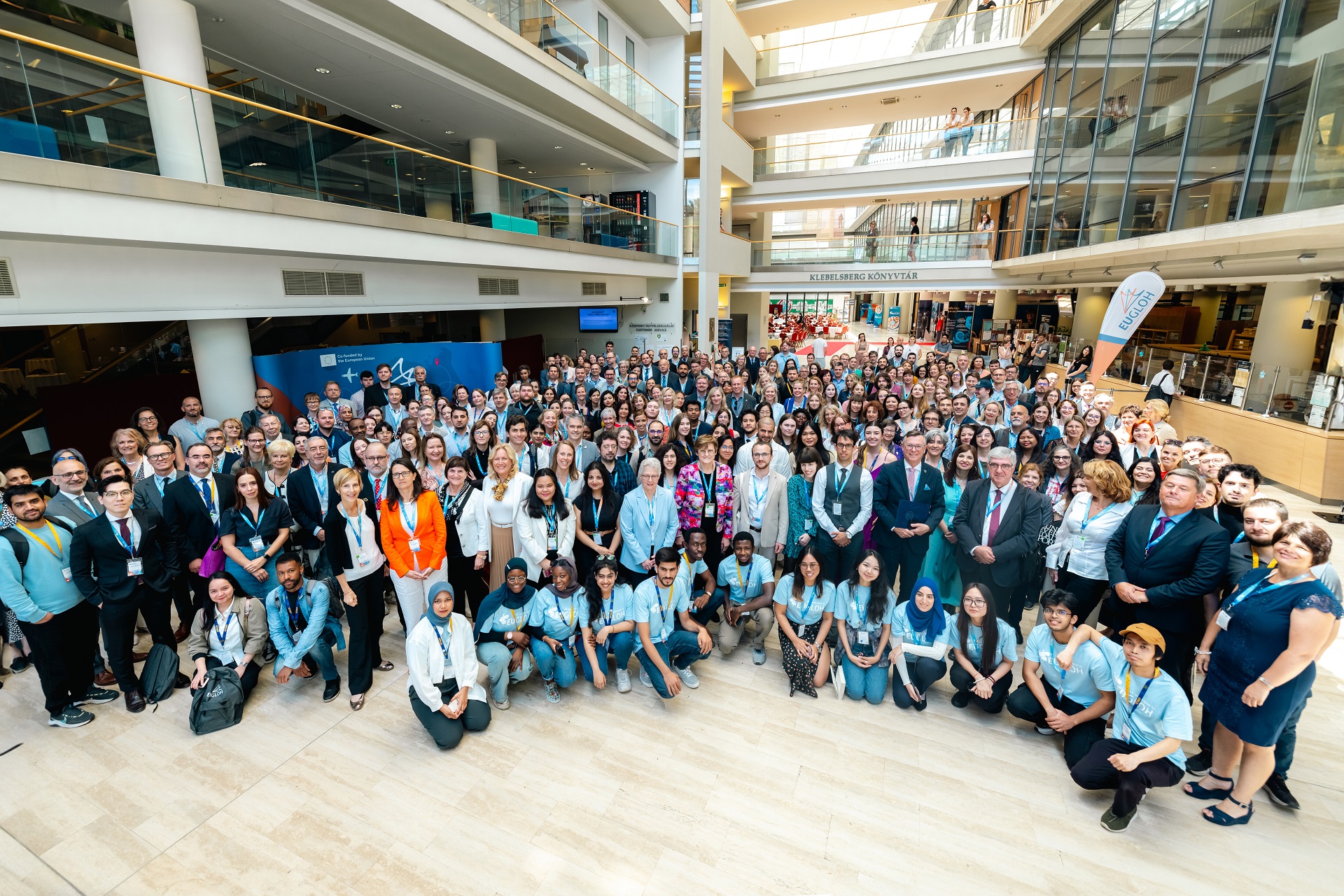
The University of Szeged hosted the annual summit of EUGLOH, an alliance of nine European universities, between June 11 and 14, 2024. The event was attended by Nobel Prize-winning researchers, including SZTE professor Katalin Karikó, who gave a presentation and held book signings on June 13.
The press day of the EUGLOH Annual Summit 2024, the annual meeting of the leading European University Alliance, got off to a strong start, as Katalin Karikó signed her book Breaking Through – My Life in Science at the exhibition titled Katalin Karikó's Journey to the Nobel Prize and Beyond at the SZTE József Attila Education and Information Center on June 13, 2024. In the long line of people waiting, representatives of different nations wanted to have their books, translated into various languages, signed by the world-famous scientist. Not everyone succeeded, but there were still opportunities to get Katalin Karikó's signature in the program series of the 95th Festive Book Week.
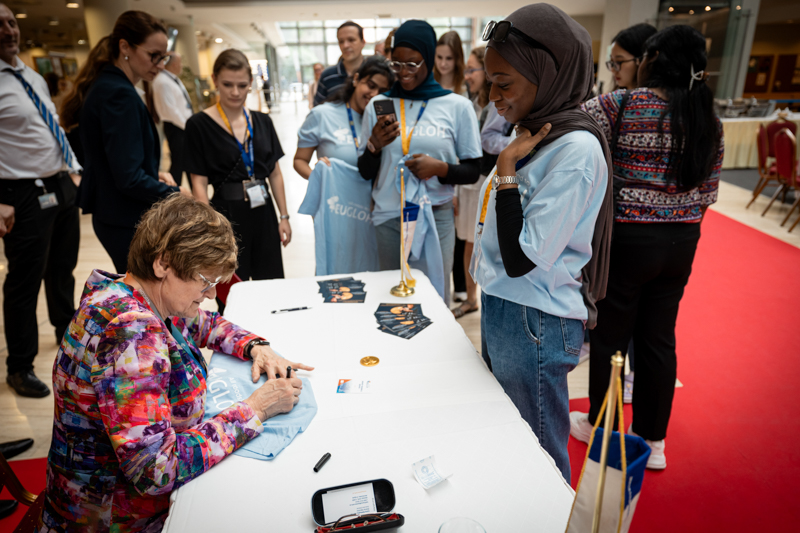
Katalin Karikó's book is a worldwide success, many people want to have a signed copy of it. Photo: Ádám Kovács-Jerney
The "European University Alliance for Global Health", abbreviated as EUGLOH, is an alliance of 9 universities with the aim of developing global health through interdisciplinary sciences. Members of the alliance gather every year to participate in personal meetings and professional conferences. This year, our city and the University of Szeged hosted the meeting, which was attended by members of the alliance, leaders of the member universities, representatives of the Pasteur Institute and the WHO, as well as Nobel Prize-winning researchers Katalin Karikó and Anne L’Huillier.
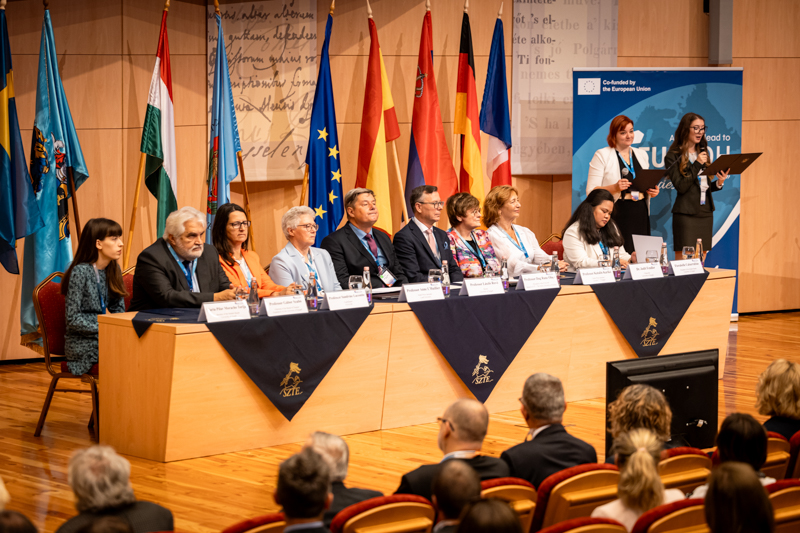
(From left) María Pilar Moracho Torija, Prof. Dr. Gábor Szabó, Prof. Dr. Sandrine Lacombe, Prof. Dr. Anne L'Huillier, Prof. Dr. László Rovó, Prof. Dr. Dag Rune Olsen, Prof. Dr. Katalin Karikó, Dr. Judit Fendler and Florabelle Cabarrubias. Photo: Ádám Kovács-Jerney
At the opening of the event, in the congress hall of the József Attila Education and Information Center, Prof. Dr. László Rovó, rector of SZTE, gave a welcome speech, and also briefly presented the history of the University of Szeged. He emphasized that, armed with its historical background, and the pursuit of excellence over the past decades, the University of Szeged joined the EUGLOH Alliance as a founding member in 2018.
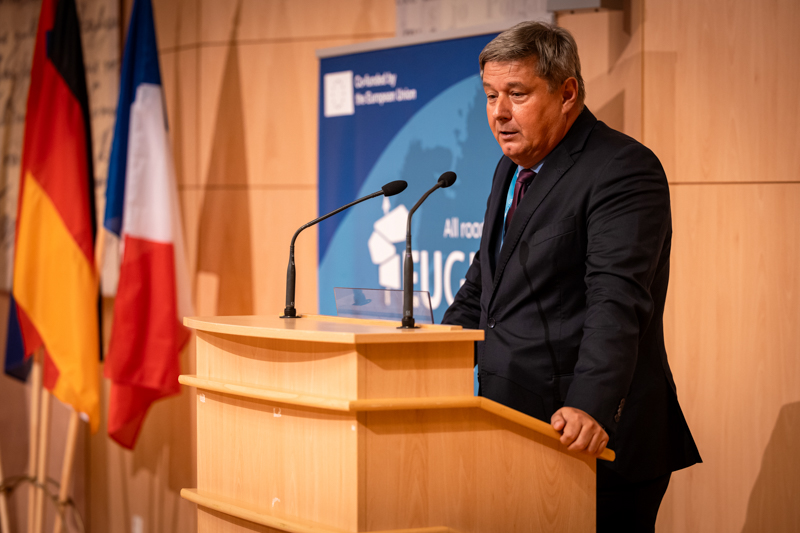
– Our common aspiration is to make EUGLOH the leading higher education network in Europe. Given that all members of the EUGLOH Alliance are among the best higher education institutions in their region and country, this common vision of ours is realistic and achievable. Nothing reflects the excellence of our higher education institutions better than the fact that in 2023 researchers from three universities received the Nobel Prize, two of whom we can welcome at our annual summit. Anne d'Huillier and Katalin Karikó are top researchers in their field. We would like to thank both of them for accepting our invitation and inspiring the students and professors of the Alliance to continue their work at a high level, said László Rovó.
Prof. Dr. Dag Rune Olsen, president of EUGLOH, spoke about the Alliance's goals, current situation, and the freedom that the alliance's universities strive for in the field of education and research. He emphasized that the member universities have invested a lot in global health development in the field of education and research, which history has already confirmed, as the COVID-19 pandemic has shown the importance of the work of scientists. He added that the EUGLOH Alliance is a platform where experts can work together to achieve common goals. Prof. Olsen emphasized that the most important goal of EUGLOH is to improve the lives of future generations, which should never be forgotten.
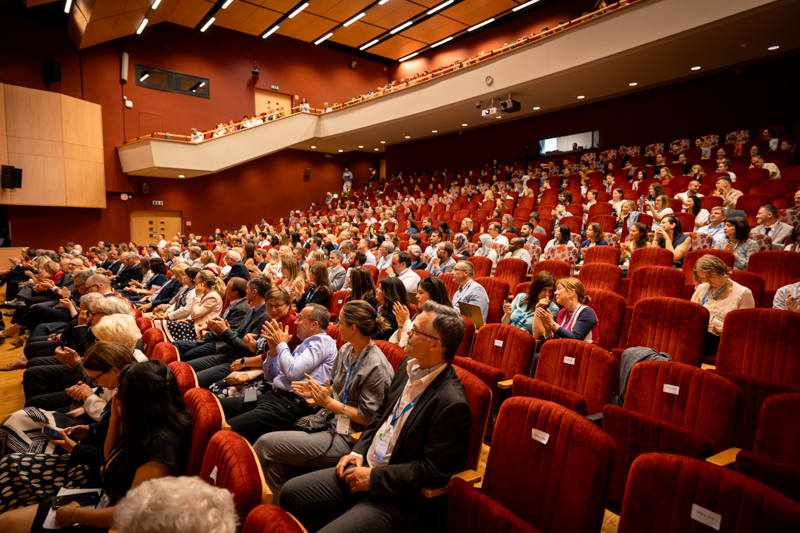
In her speech, Prof. Dr. Sandrine Lacombe, the coordinator of EUGLOH, pointed out that Europe can be made stronger and better by this alliance, which has expanded and now covers the continent from east to west, from north to south. In the current geopolitical situation, the work of the alliance is even more important. She explained that it is necessary to adapt to social and global changes, which is difficult, but still achievable together, as the alliance has the necessary knowledge and creativity. It is also important to use the power of the community in terms of research and education. According to her, research is equally important for achieving goals, one of which is acquiring and passing on new knowledge. Similarly, education aims to provide a solid foundation for research.
On behalf of EUGLOH students, two leaders of the International Student Board shared success stories related to the Alliance. The greatest interest accompanied the lectures of the two 2023 Nobel laureate researchers, who were introduced and praised before they went on stage by Prof. Dr. Márta Széll.
Katalin Karikó and Drew Weissman have been awarded the 2023 Nobel Prize in Physiology or Medicine for their biochemical discoveries that enabled the development of an effective mRNA-based vaccine against COVID-19. The alumna and current professor of SZTE emphasized motivation in her presentation held at the conference, delivering it in her usual relaxed and direct tone. In her speech, she gave examples from her own life of the importance of dedication, perseverance, and a sense of purpose. She mentioned that anyone can become a scientist regardless of her family background, in which teachers and fellow students also play an important role. She applied to the University of Szeged because that was when the Szeged Biological Research Center opened, and she really wanted to work at the institute. She drew the attention of the students sitting in the audience to the fact that it is important to have a dream and to find the significance even in the seemingly smallest task, which is important in terms of achieving long-term goals and gaining experience. Katalin Karikó said that without the obstacles and tasks to be solved during the research work, she would not have achieved what she managed to. Things that seem negative at first glance – if, for example, a lab doesn't have all the tools or materials for research – can later turn out to enrich you with the creativity necessary for a solution. The SZTE Professor also gave her opinion on success, which means different things to different people. She also gave useful advice to EUGLOH students, for example, to love their work and be determined, believe in themselves, learn to use stress positively, focus on their ultimate goal, and try to exclude distracting factors. She also drew attention to the fact that sometimes it is worthwhile, even necessary, to leave the comfort zone, since it is possible to learn from it and sometimes it is even essential for moving on. Her presentation was received with huge applause by the enthusiastic audience.
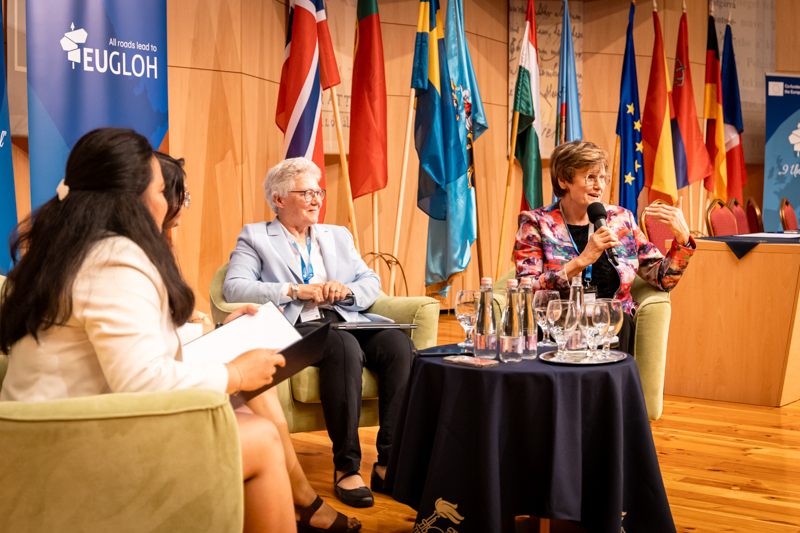
It is rare to be able to ask two Nobel laureates at the same time. Anne L'Huillier (center) and Katalin Karikó answered the questions of the students and the audience in Szeged on June 13, 2024. Photo: Ádám Kovács-Jerney
Ferenc Krausz, Pierre Agostini, and Anne L'Huillier were awarded the 2023 Nobel Prize in Physics for experimental methods that generate attosecond light pulses. In her speech, Anne L'Huillier, another Nobel laureate honorary lecturer at the EUGLOH Annual Summit, talked about how five different universities influenced her career. In addition to the Paris-Saclay University, the University of Munich (Max Planck Institute), the University of Porto, and her current workplace, the University of Lund in Sweden, she emphasized that the University of Szeged and the affiliated ELI ALPS were also of decisive importance in terms of her career and life. The phenomenon she worked on is also used by five secondary sources of the ELI ALPS in Szeged, and the research institute conducts unique research in this field with the cooperation and leadership of SZTE professors. She emphasized the importance of the personal relationship she has with Prof. Dr. Katalin Varjú, the scientific director of ELI ALPS, with whom they published 28 joint scientific articles on the subject since 2003.
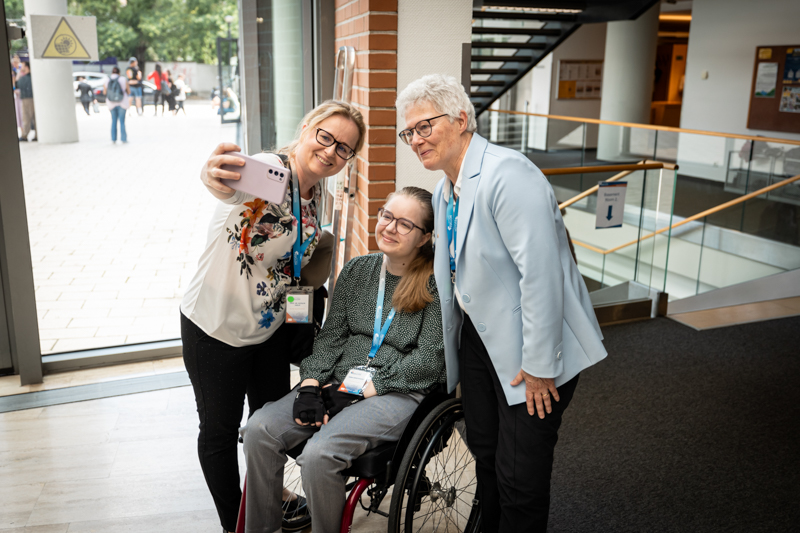
The scientific collaboration between Prof. Dr. Katalin Varjú (with phone) and Anne L'Huillier (right) goes back a long and fruitful history. Photo: Ádám Kovács-Jerney
The presentations were followed by a round table discussion, during which two students of SZTE, Florabelle Cabarrubias and Divyanshi Divyanshi, asked Katalin Karikó and Anne L'Huillier about their scientific work and their lives. It turns out that Columbo, the popular TV detective character, and scientific researchers have one thing in common, they always have "one more question". At the end of the discussion, the audience was given the opportunity to ask from the Nobel laureates.
At the end of the meeting, a group photo was taken of the members of the EUGLOH Alliance, and then the program continued with a plenary session, which was led by Anna Baumer Machado and Prof. Dr. Márta Széll, strategic vice-rector of the University of Szeged. Robb Butler from the WHO Regional Office for Europe gave a presentation entitled "Hot topics in global health”. Dr. Carlos Batthyány, executive director of the Pasteur Institute in Montevideo, gave a plenary lecture on the development of the treatment of type 2 diabetes, and Prof. Silvia Melo-Pfeifer, a lecturer at the University of Hamburg, talked about "Global health, migration, and fake news: lessons learned from a European project”.
The morning part of the conference was closed by Prof. Dr. László Rovó, rector of the University of Szeged, and Dr. János Bóka, minister responsible for European Union affairs. The minister said that he graduated from the University of Szeged, and started working in the city and although he is often in Budapest due to his work as a minister, he returns home to Szeged. He emphasized that European integration and the alliance between universities have many similarities. In both areas, the participating partners indeed strengthen each other, and the successes of the competitors strengthen all participants, and they can take advantage of their diversity. He explained that Hungary's EU presidency will begin in 17 days, during which healthcare and higher education will also play a significant role. The minister said that the goal of the Hungarian government is to promote the development of international research and educational projects. The main goal of the Hungarian EU presidency is to support European health development and research activities. Dr. János Bóka said that EUGLOH is an excellent example of how institutions with different backgrounds can cooperate for a common goal. In terms of higher education, the most important focal points will be quality control, the unification and recognition of various academic degrees, making higher education careers attractive, and European diplomas. The challenges related to the COVID-19 pandemic are still significant in the healthcare sector – cardiovascular diseases, mental health, and the re-invigoration of pre-pandemic research directions will be the most important tasks. Finally, he emphasized that also during the period of the European Union presidency, the government is counting on the cooperation of higher education institutions and organizations, including the University of Szeged, in matters affecting the health of the European community.
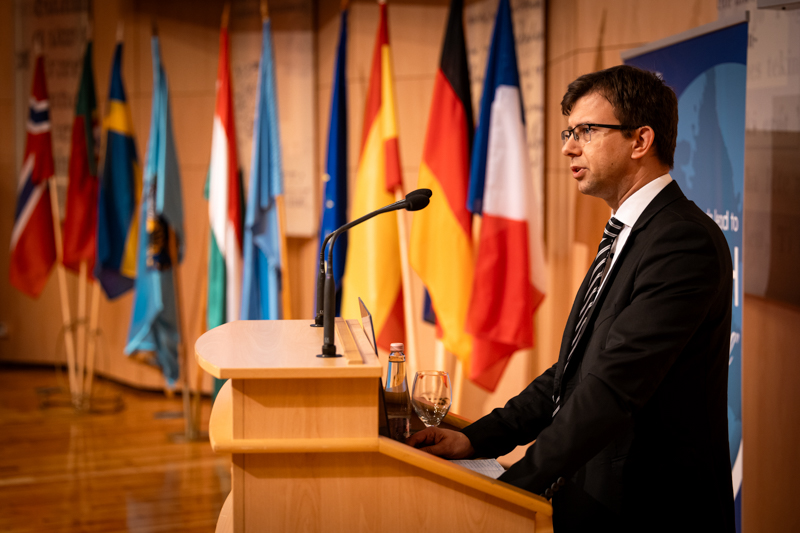
Finally, he emphasized that also during the period of the European Union presidency, the government is counting on the cooperation of higher education institutions and organizations, including the University of Szeged, in matters affecting the health of the European community.
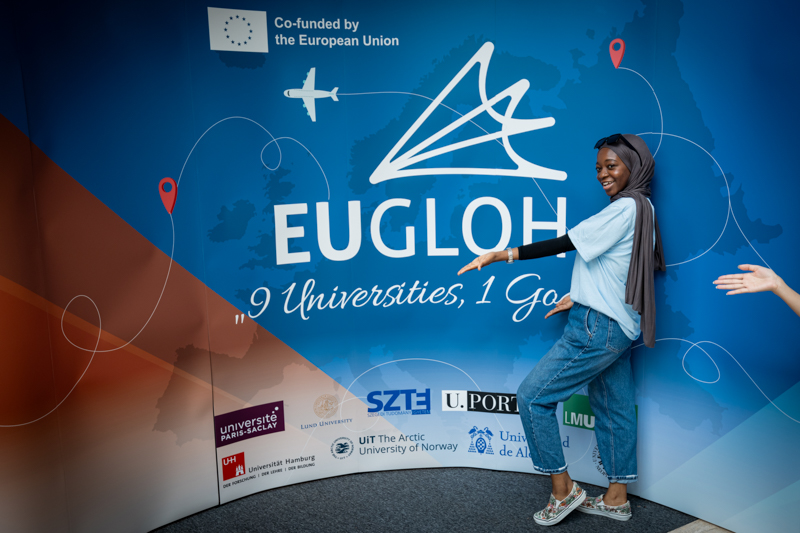
The EUGLOH 2024 Annual Summit program continued on Thursday afternoon with plenary presentations and panel discussions. On Friday, workshops, coordinator meetings, and management discussions, as well as award ceremonies, and finally the closing ceremony completed the event.
Written by: Ferenc Lévai
Photos: Ádám Kovács-Jerney, István Sahin-Tóth

